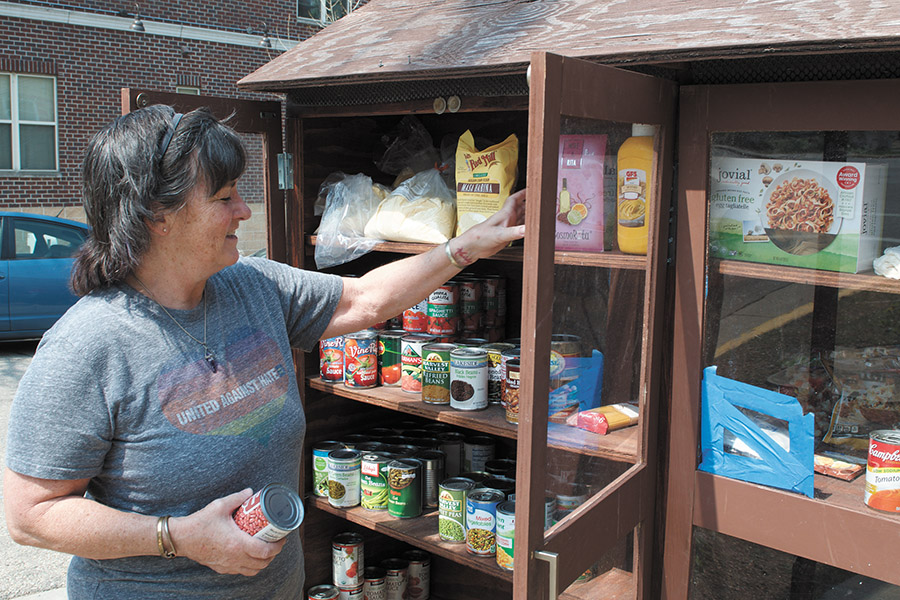Kristin Mathews remembers the first time she handed a new pair of socks to someone in need. She recalls their face lighting up with unexpected delight and boundless gratitude.
“Even if it’s the most minute thing, like a clean pair of socks, and somebody’s so overjoyed, they’re almost crying. It’s like, oh my God, it makes you do a self-check.”
Mathews, a retired East parks supervisor for the City of Madison, has volunteered at the Willy Street Pantry since 2019, a free community and essentials pantry that relies on donations.
The Willy Street Pantry is part of the Social Justice Center, which houses 20 social justice organizations, hatching new projects and start-ups.
Mathews stocks and maintains the pantry throughout the week, where non-perishable food items are stored in the outdoor pantry at the corner of Williamson Street and Few Street and are available 24-7.
Wednesdays at 3 p.m. is a free food pop-up where the Willy Street Co-Op and the Fresh Food For All donate fresh food and produce, with many grocery items coming from Festival Foods.
Supplementing the pop-up pantry are resources that include the “essentials pantry.” The under served can find diapers, toiletries, move-in kits, and household items available by appointment on Wednesday from 3:30 to 6:30 p.m. Pick-up requests can be made through an online form.
In 2020 and 2021, during the height of the pandemic, the Willy Street pantry, like many nonprofits, experienced high giving, but the donations have since declined.
Feeding America estimates the number of people who received assistance nationwide to be 53 million in 2021 and 49 million in 2022.
While the Federal COVID Health Emergency has ended, vaccines and medication are free. However, food assistance is still needed, with many experiencing food insecurity.
A typical day for Mathews is to stock non-perishable in the morning. Stocking groceries only takes a few hours, but the pantry is picked over quickly.
When asked about the pantry’s most popular food item, Mathews was frank.
“Honestly, as far as food, anything we get, the minute we put it out, it’s gone. There’s a huge need.”
Formula and Diapers
The Supplemental Nutrition Assistance Program offers food benefits to low-income families to boost their grocery budget. Still, it doesn’t allow for hygiene products, shampoo, soap, or other necessary products like formula and diapers.
Those in need are often forced to choose between paying for necessities and buying groceries.
The pantry receives donations for necessities like diapers, which are donated from a local diaper bank every month, which they distribute to families.
Barriers
The Social Justice Center volunteers understand the barriers many people in need undergo.
Mathews describes the roadblocks she sees. She has seen the need and knows others who don’t need these services don’t fully understand the demand. She interacts daily with people who wonder why others can’t make it alone.
“They’re like, ‘Well, why don’t they just, get a car? Why don’t they just get an apartment?’ It’s like there are so many barriers along the way.”
Mathews sees an unending list of obstacles, hurdles that often frustrate those most in need.
“It’s not just a matter of getting a car. Then you have to register it, and then you have to get a license. ‘And why did you let your license expire two years ago? Because I had to choose between paying for the reinstatement of my license or buying groceries.'”
Mathews says there are so many barrier levels that it’s hard to comprehend. “There are just so many levels. It’s ridiculous. Honestly, once somebody’s in that hole, it’s so hard to get out.”
According to the Community Action Coalition, Madison is no stranger to food pantries, with approximately 50 food pantries, meal sites and shelters throughout Dane County. What makes the Social Justice Center stand out with so many resources available?
“We are a place where people can come in and know from experience or word of mouth that they won’t be dismissed or looked down upon. They feel seen and heard.”
Volunteering comes with challenging days, watching food donations run low or the demand for it too high. Remembering the delighted and grateful faces inspires Mathews, who feels on a mission.
“A lot of times, that’s all new people need — is that connection.”


























